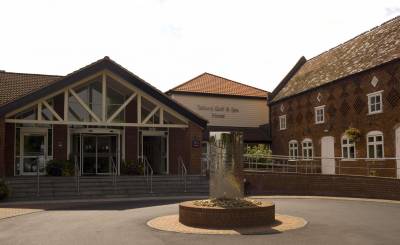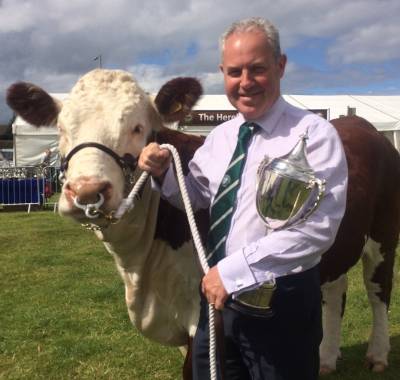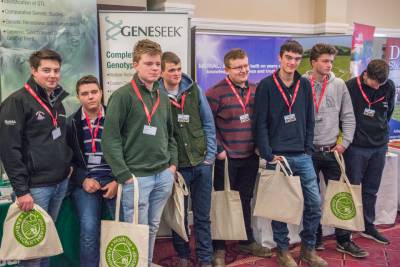Our Chairman, Andy Dodd, talks about BCBC and its role within the industry

British Cattle Breeders Club 2017 Chairman, Andy Dodd has some exciting plans for the 2018 Conference programme. Despite his role as Technical Manager for Genetics and Fertility at AHDB Dairy, his aim is to ensure that both the dairy and beef sectors are fully represented. He is currently working with the BCBC committee to put together a list of speakers whose subject matter will be informative, as well as provoking further debate and discussion.
The annual British Cattle Breeders Conference always has a theme and the 2018 event will be focused on inspiring the younger generation to consider a career working with cattle or in a related industry, says Mr Dodd. He also believes that the conference should adopt a positive approach to driving the industry forward.
“It is all too easy to become caught up in the complexities associated with Brexit and concentrate on the potential negatives,” says Mr Dodd. “I feel that one of the most important roles of the Club and of the Conference is to highlight the importance of developments in the field of breeding genetics over the next 10 years. Science is moving very rapidly and it is vital that farmers make use of new techniques, especially as we are facing ever-increasing challenges.”
“Another goal of the Club and the Conference is to encourage young people to join us in the industry; they should be excited, about the future. A recent survey found that many jobseekers find the idea of working on a farm unpleasant and we must take action to change that perception.”
“We must also make sure that farmers’ sons and daughters in particular do not feel excluded. Their interest has to be sparked at a young age and not make them wait until they are in their thirties or their forties, before allowing them to get involved in the decision-making process.”
”Feedback from students who attend the Conference is always positive and some will become regular delegates after graduation. Several individuals who came to the Conference while they were at
college have gone on to join our committee and have even become sponsors of the event.”
Mr Dodd, who does not come from a farming background, says that the industry must ensure that both young people from farming families and those with no previous experience of working with cattle perceive it as an attractive career prospect. Having gained a degree in agriculture at Harper Adams University, Mr Dodd worked for several years as a dairy herd manager, before joining the team at AHDB Dairy.
“It could be argued that farms are one of the most diverse environments in which to work,” he says. “A farm worker will look after animals and understand veterinary and medicine procedures, grow crops, carry out building work, practise driving skills and gain an understanding of machinery, as well as how to use computer software programmes. Farming will give any young person a good general grounding, as well as wide experience and a chance to find their own niche.”
“On a farm, no two days are ever the same and on a well-managed unit a worker will get involved in making decisions and see the effects of those decisions when they are put into practice. A farm is also a place where relationships are forged which often last for a lifetime. Good stockmen in particularly are highly prized and are usually well rewarded, although admittedly the job may involve a long working day and sometimes unsocial hours.”
While he acknowledges that rising prices and poor returns have affected farm business, he issues a word of warning.
“We are all aware that the market has become more volatile but we must try and make sure that we don’t adopt a perpetual attitude of ‘doom and gloom,’ he says. “At our annual Conference, we book
programme speakers with clear ideas of how cattle breeders can build strong businesses, by identifying problems and offering practical solutions. Some of these solutions will be science-based and the Conference offers a forum in which new ideas or technology can be debated.”
Mr Dodd’s previous experience as a herdsman is perhaps why he is keen that the BCBC shouldnmaintain a strong focus on grassroots farming, as well as providing a forum for the exchange of information and ideas on cattle breeding in general. He says he was pleased to be invited to take on the role of 2017 BCBC Chairman.
“I have always found the British Cattle Breeders Club to be a very friendly and welcoming organisation and that is why I was delighted to accept the chairmanship,” he says. “The Conference is a reflection of all of the personalities involved and many of our delegates place a high value on the networking which takes place during the hours outside the official programme.”
“It is a misconception that the Conference is an event which mainly caters for pedigree breeders, although all of the main breed societies are represented, of course. The Conference is about commercial producers and breeding techniques that they can adopt to improve the quality and efficiency of whatever type of beef or dairy animal suits their business,” says Mr Dodd.
Join us for our 70th Anniversary at the 2018 BCBC Conference ‘Farming and Genetics – let’s inspire the next generation’
22-24 January, Telford Hotel & Golf Resort, Telford, Shropshire

This year’s Chairman, Andy Dodd, is keen to continue and celebrate the successes of recent conferences which have seen some of the highest attendances within the club’s history. The 2018 conference will celebrate its 70th Anniversary since its first meeting in Cambridge in 1948. The club wishes to celebrate this special occasion during January’s conference and we very much hope you will join us for what promises to be an informative and celebratory occasion for beef and dairy cattle breeding.
The theme will take ‘Farming and Genetics – let’s inspire the next generation’, continuing its focus on linking practical cattle breeding with science whilst inspiring the next generation of cattle breeders. The conference will start with a beef workshop on the Monday afternoon, with the main conference programme commencing on Tuesday morning with papers dedicated to the beef industry followed by the club’s AGM. There will also be a dairy workshop running in a parallel session after lunch on the Tuesday afternoon. The conference dinner that evening will celebrate the 70th Anniversary, followed by a guest speaker. The final day of the conference on Wednesday will present papers dedicated to the dairy industry.
The conference not only provides technical insights with thought provoking papers it also offers an excellent opportunity for networking with other breeders, scientists and industry representatives, in a relaxed and friendly environment. Accommodation is available in the conference hotel and can be reserved through the secretary once event booking is open.
The 2018 conference programme and booking details will be available in the autumn.
BCBC President, Prof. Mike Coffey looks at the industry and its future
British Cattle Breeders Club president, Mike Coffey believes that the UK beef industry’s response to Brexit will define its future, whether that turns out to be a success or a failure. Doing nothing, he says, is “not an option.”
Following Brexit, the beef industry will be facing a totally different set of circumstances, compared with anything that has been experienced over the past 40 or 50 years, according to Professor Coffey, a
researcher at SRUC (Scotland’s Rural College).
“Producers will have to get to grips with the undeniable fact that their businesses will have to change, in order to survive,” says Professor Coffey. “It is not going to be enough to assume that trading conditions are going to be similar and that subsidies will continue, albeit from a different source.”
“The crucial issue is that the UK beef price is the highest in the world; in June of this year, UK beef was one Euro more expensive than other products available on the global market. Therefore, our opportunities for export are going to be limited, as our high prices will act as an open invitation for buyers of beef to look to the world marketplace, in order to secure supplies.”
Farms will not be the only businesses in the supply chain to be challenged by the UK exit from the European Union, he predicts.
“Beef processors have invested many millions of pounds in sites and equipment and their profitability depends on achieving a high throughput of animals. If the large retailers move away from buying home-produced beef, they will also suffer badly.”
“Many of the supermarkets have publicised their commitment to UK beef supplies. The key question is: At what price differential will our supermarkets turn away from UK beef and look to imported products? We have no answer to this question at present, but it is a good starting point for a discussion.”
Professor Coffey is quick to point out that beef producers have no control over many of the main issues which affect their industry. However, they do have access to technological advancements, which can help them to increase their returns.
“The British Cattle Breeders Club exists partly as a forum in which to question and explore options for promoting a thriving cattle industry,” he says. “There are a number of breed traits which are economically significant and many are already being used for cattle selection; the two most important for the future are feed efficiency and meat quality. The UK is in the fortunate position of having genomic values for Limousin beef cattle carcase traits and there are very few other countries which have access to this type of information.”
“Management also has an effect on beef cattle profitability and age of slaughter is one area where positive changes might be made, although a move in this direction will require a degree of supply chain management. The fragmentation of the beef industry is a hindrance and that is why the BCBC often invites processors and retailers to speak at the annual Conference.”
On a national scale, producers are keeping finishing cattle for too long, he suggests.
“The average age at slaughter is 28 months. One common misconception is that grass is ‘free.’ Grass is most certainly not free and the associated costs must be factored in to any business plan. It may be worth spending money on additional feed, if it means that two batches of cattle can be put through in the same length of time it takes to produce one.
“Rapid finishing will have a beneficial effect on cash flow and the system will also allow the producer to react more quickly to market changes and sell when prices are high. Conversely, the options may be limited for an animal that is half-way through a longer finishing period, for example.”
“Longer finishing also increases financial risk, with cattle of high value grazing in the field and where even a single death will reduce profitability. Some cattle producers are achieving much shorter finishing times than the average and are making a profit. We need to identify what they are doing differently.”
Despite his predictions, Professor Coffey believes that extensive cattle rearing systems will continue to suit some farms.
“Extensive finishing can fit in with the new era, helping to match all year round supply and providing consumers with high quality beef from animals which are grass fed and late to mature. These animals will command a premium price in the marketplace, selling to local outlets which are prepared to pay extra for food with reduced food miles and whose customers are looking for a product with provenance.”
Another area where the individual breeder has some level of control over the end price is bull selection, he says.
“Dairy farmers are using sexed semen and choosing beef bulls whose progeny is likely to have a high retail value. In addition, the industry will shortly have access to figures for Limousin sires which give a value for feed efficiency.”
“The future prosperity of the industry is also dependent on the fair distribution of profits across the supply chain and the free flow of information between all parties involved,” he added. “In the current climate, we have UK cattle taking a long time to finish and selling at an average £3.40/kg, while the world price stands at £2.50/kg. That has to change and now is the time for the beef cattle industry to take action,” says Professor Coffey.
Sponsorship Opportunities – BCBC 2018
There are many sponsorship opportunities available for the next British Cattle Breeders Conference taking place from 22-24 January. The sponsorship packages for 2018 are designed around farmer and student places where sponsors can bring along some of their key customers to the conference.
The main packages start from £700 and depending on the package chosen the benefits include:
● farmer places or student places (sponsor preference) with or without accommodation according to package
● a small stand during the conference
● acknowledgment of support prior to and during the conference, through our website - including website link and within the annual proceedings produced, the ‘Digest’ publication
● meeting room available for ½ day
● promotional material in delegate packs
● advert in the Digest
● delegate day places for members of staff
Further options available could include the evening drink receptions or the sponsorship of a young person or student to attend.
For full details of the sponsorship packages available and booking form or to discuss the opportunities in more detail, please contact the secretary Heidi Bradbury.
“Fantastic” says Alltech’s national beef manager
Stuart Gibbons of Alltech went to his first British Cattle Conference as a student in 2013 and has attended the event ever since, with his company becoming a sponsor in 2017 and currently in talks about continuing in the role for next year.
Mr Gibbons describes his first Conference as “fantastic”.
“I came away from my first British Cattle Conference feeling so impressed that I always made a note of the date of the next year’s event, as I felt it was an opportunity that I did not want to miss,” says Mr Gibbons, who is Alltech’s national beef manager and is also in charge of dairy field sales in the North West.”
“I am not aware of any other conference which has a day dedicated to beef and one to dairy, so it fits in perfectly with my responsibilities at Alltech. It puts me in touch with a wide audience in both sectors.”
Stuart’s presence on the Alltech promotional stand and in the audience during the speaker presentations are not the only positive aspects of the Conference, he stresses.”
“It attracts a lot of influential people involved in cattle breeding and I will meet up with many of the delegates at other events throughout the rest of the year. But I also put a high value on the networking opportunities that are available during the break times and in the evenings, when the programme has finished.”
“The Conference atmosphere is brilliant and I find people very friendly, so it is also an enjoyable experience. I understand that it is the BCBC’s 70th anniversary next year and I have no doubt that the 2018 Conference will be just as good – or perhaps even better – than usual,” he says.
A Message from The Hereford Cattle Society’s David Deakin, a sponsor since 2012

The Hereford Cattle Society has been a sponsor of the British Cattle Breeder’s Club since 2012 and we are proud to be involved with a Club which offers the beef industry a platform to debate topics of national and international importance. We have always found the BCBC Conference to present a variety of interesting topics, all with a practical base.
The Hereford Cattle Society has seen a continuing increase in popularity over the past 15 years, recording year-on-year rises in membership and pedigree registrations, which are at the heart of any
Society’s business. However, what is just as satisfying is the increased demand in the use of the Hereford sire in the commercial sector.
The combined total of Hereford-sired calves, as recorded by the British Cattle Movement Service (BCMS), was up 12.6% in 2016 from the previous year, while figures recorded by Animal and Public Health Information System (APHIS) in Northern Ireland were up 22.6% on the previous 12 months. Combined BCMS & APHIS figures were up 14% over the calendar year 2016 and up by 84.0% during the past 7 years.
As a Society, we often get asked why has there been such an increase in these figures. The simple answer would be to say that the branded Hereford Beef Schemes have lifted the profile of the breed and since Dunbia’s involvement with Hereford beef from 2013, we have definitely seen an upsurge in popularity. So whilst it is true to say the branded beef schemes have given the breed great exposure within the beef industry, it is certainly not the only significant reason for the increased use of the Hereford sire.
In fact, the difference between Hereford sired calf registrations and the number of carcases being marketed as branded Hereford beef has increased by 60% in the past 7 years. We can all see the benefits to the breed of these branded schemes, but it is reassuring to know that the breed’s increase in popularity is also down to its many attributes; not least its ease of management and lower production costs.
Tomorrow’s generation – students

Holly Sleightholme
Holly, age 19, has finished a level three qualification in agriculture and is spending the summer contract shearing and working as a tractor driver at harvest time. She was brought up on a mixed farm in Norfolk and attended the Conference for the first time this year.
“The Conference really stimulated my interest in cattle and I thought that all of the presentations were relevant. I would pick out the American scientist who spoke about gene editing and the banker’s talk on finance as two of the most interesting.”
“My student group stayed on for the dinner and that was one of the highlights. It took place on Burn’s night, which is something I have never experienced before; I also tried haggis for the first time and liked listening to the bagpipes. I would go to the Conference again, because it focused on the key issues in agriculture.”
Holly has recently taken over her parents’ contract shearing business and it is a matter of pride that she continues their work.
“I mostly work on my own, but I have also been asked to shear as part of a gang and I will take on other farm work throughout the year. That will allow me to keep my list of shearing customers. I would not want to lose their custom, as my parents set the business up before I was even born.”
Megan Atkins
Pedigree cattle are Megan Atkins’ passion and the primary reason why, at just 20 years old, she has already attended four British Cattle Conferences and it is an annual event in her diary. The student, who has always enjoyed working on her grandfather’s mixed farm, is in her final year of a foundation degree in farm management at Easton College.
Megan is currently earning money by working with 400 suckler cows on a commercial unit, as well as looking after her own small herd of Continental crossbreds. She also shows cattle from her grandfather’s ‘Brae’ herd of Aberdeen Angus, with a young bull achieving a class win at the Suffolk Show.
Already qualified as an AI technician, Megan uses semen from a pedigree Limousin to speed up the genetic progress of her herd.
“The first Conference opened my eyes to new aspects of cattle breeding and gave me an insight into the bigger picture,” says Megan. “I particularly like the fact that speakers come from all over the world and there is something of interest in every presentation.”
“It is a good place to learn about not only new science and technology, but also techniques which might help to improve the quality of breeding stock in the years to come. I want to progress in my knowledge of cattle and I hope to have my own pedigree herd of Charolais in the future. The Conference is a good way to meet like-minded people. In 2017, I attended the evening dinner for the first time and found it very enjoyable.”